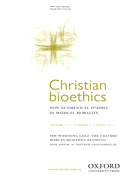-
Views
-
Cite
Cite
Mark J. Cherry, Sex, Abortion, and Infanticide: The Gulf between the Secular and the Divine, Christian bioethics: Non-Ecumenical Studies in Medical Morality, Volume 17, Issue 1, April 2011, Pages 25–46, https://doi.org/10.1093/cb/cbr005
Close - Share Icon Share
Abstract
This paper critically explores key aspects of the gulf between traditional Christian bioethics and the secular moral reflections that dominate contemporary bioethics. For example, in contrast to traditional Christian morality, the established secular bioethics judges extramarital sex acts among consenting persons, whether of the same or different sexes, as at least morally permissible, affirms sexual freedom for children to develop their own sexual identity, and holds the easy availability of abortion and infanticide as central to the liberty interests of women. Secular bioethics seeks to separate children from the authority of their parents, placing children themselves as in authority to make their own judgments about appropriate lifestyle choices, including sexual behaviors. As I argue, however, absent God, there exists no standpoint outside of our own cultural sociohistorically conditioned understanding from which to communicate any deeper perspective of reality or the bioethics that such a perspective would secure. Consequently, rather than discerning moral truth, secular bioethics merely affirms its own particular cultural sociohistorically conditioned ideological perspective. It is a social and political worldview bereft of definitive moral foundation, independent moral authority, or unambiguous content.




